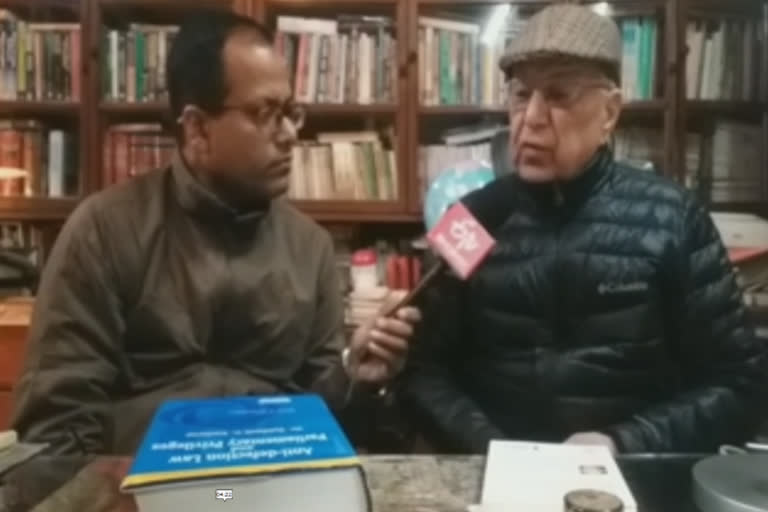New Delhi: With numerous political defections across states raising eyebrows of late, the changing of party affiliation for 'narrow political gain' has compelled the Supreme Court to intervene into the matter.
Senior constitutional expert and former secretary-general of Lok Sabha, Dr Subhas C Kashyap, however, feels that the Election Commission (EC) must be entrusted with the task of looking into the matter of defection by leaders.
Dr Subhas C Kashyap, a distinguished scholar, said that this is a serious matter and much can be said on the subject of changing party affiliation by members.
"There is no doubt that everyone including members of Parliament and members of the state legislature are entitled to act on their own benefit. Question is whether the change in party is for narrow personal self-interest, for getting ministership, or for getting monetary rewards!" he said.
In the recent past, political equations in several states including Karnataka, Goa, Manipur, followed by changing of party affiliation by legislators has created massive controversies.
"Sometime back it was told that the members were sold for a price or they were auctioned giving glaring instances of the ugly face of Indian politics and democracy," said Dr Kashyap.
Dr Kashyap said that there is, however, scope for principle change of party affiliation. "The question is whether a member elected to parliament or state legislature, is a representative of the constituency or represents a section of people or a party..." he said.
Anti defection law is based on the belief that those who contest the election on a particular party ticket are wedded through the ideology and programme of the party.
ALSO READ: Sri Lanka PM receives ceremonial reception at Rashtrapati Bhavan, meets PM Modi
"There has been serious doubt expressed in recent decades whether the party themselves are wedded to any principles or programmes, parties themselves keep changing their affiliations to ideology on the basis of convenience of the moment or even for power, parties may give up their principles," he said.
Dr Kashyap expressed apprehension that in the current format of deciding on the defection by Parliamentary or Assembly speaker or by the chairman "may be biased."
"Many years back when the first edition of my book on anti-defection law came, I had suggested that it is perhaps not very wise to entrust the judgement in connection with the disqualification of members on the ground of defection to Speakers or chairmen of the House. Because by tradition they are partymen. They themselves were elected on the party ticket and continue to be a member of the party, unlike British House of Commons, where once selected as a speaker, the member is supposed to severe his links with any political party," said Dr Kashyap.
He has suggested that the question of disqualification of members on grounds of defection should be entrusted to an independent tribunal or to the Election Commission (EC) "so that the presiding officers are also freed from any allegations of partiality or favouring their own party."
Referring to the recent directives of the Supreme Court where it has asked the Parliament for setting up an independent tribunal to look into the defection matter, Dr Kashyap said that EC could be entrusted with the task.
"The EC is a non-party body. It has commanded tremendous respect for their impartiality and they are not party people in any case. So, instead of setting up a tribunal, the matter related to defection could be referred to the EC," said Dr Kashyap.
Dr Kashyap was former Secretary-General of 7th Lok Sabha, 8th Lok Sabha and 9th Lok Sabha and Lok Sabha Secretariat from 1984 to 1990.
During the course of his tenure as Secretary-General, Dr Kashyap also witnessed many incidents where party leaders changed their affiliation for their own benefit.
"It will be wrong to flag any particular instances because there were hundreds of them. There was a time when within a month several governments were toppled as a result of defection. There were also instances where a member changed his party affiliation five times in a month," he said adding "In many states, the trend was commonly known as Aaya Ram-Gaya Ram (leader coming to a particular party and on the next day switching sides yet again)...It had become a phenomenon. It became impossible to have a lasting government in some of the states."
In the recent past, the Supreme Court, in a case related to the Manipur Assembly members, asked the Assembly Speaker to decide the fate of the MLAs who change their party affiliation in four weeks.
"Yes, it has been more tragic that some presiding officers have taken years to decide on petitions against defection. There must be a time limit. Perhaps laws need to be amended or rules need to be amended to ensure that decisions are taken at the earliest," said Dr Kashyap.
The anti-defection law is contained in the 10th Schedule of the Constitution. It was enacted by the Parliament in 1985. It came into effect on March 1, 1985.



